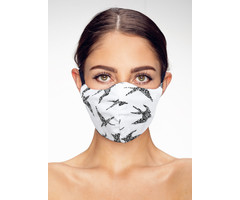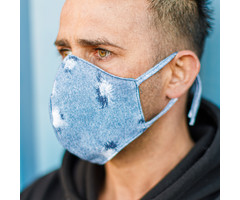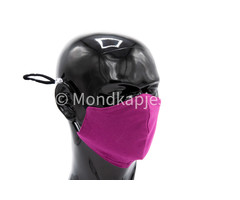Reusable Face Mask - Washable Face Mask Wholesaler Supplier
Reusable Face Masks
Face masks have been fairly popular in recent years, but this is a relatively recent trend all around the world in the wake of the COVID-19 pandemic. The unexpected and widespread use of face masks has produced some additional inconvenience for all of us, as well as waste for the environment.
Reusable masks, on the other hand, can help relieve or even eliminate some of these issues. Their use, in particular, can help to mitigate much, if not all, of the environmental impact of masks. They'll almost certainly assist you with the financial implications as well.
So far, we've observed that a surge in demand for masks, combined with a lack of methods to properly dispose of them after usage, is wreaking havoc on the environment (in the shape of waste). But, after all, we live in a strange and difficult era, one in which masks are vital.
Reusable face masks are useful in this situation. They work in the same way as single-use ones: they force air through a filtering substance, eliminating water droplets that carry virus particles around. The main distinction is that these masks are intended to be worn, washed, and reused for months, if not years.
Medical-grade single-use masks are comprised of layers of plastic materials, and reusable medical masks come in a variety of styles. However, because our doctors and nurses require these right now, I advocate using homemade or professional fabric masks instead.
Such masks aren’t used in hospitals because they don’t offer enough protection against a host of pathogens. But for the general public, where the main point of concern is preventing coronavirus-bearing particles from entering our mouth or nose, even makeshift masks (such as tightly-wrapped scarves) are effective at preventing the spread of the virus between individuals. They are also moderately effective at reducing the volume of droplets emitted by a carrier and the range they’re exhaled at.
What is a Reusable Face Mask?
A reusable face mask is constructed of cotton-like fabric and can be used multiple times. Replaceable filters are available on some models, which help to keep them cleaner. Their styles vary; some are bright and appealing to children, encouraging them to wear a mask. After each use, reusable face masks should be cleaned.
Reusable Face Mask with Filters
There are several excellent reusable, washable non-medical face coverings with detachable filters on the market. Replace the filter frequently – ideally after each usage – and wash your mask daily, allowing it to dry completely before putting it back on. There are also washable masks with built-in filters that don't need to be replaced. The mask should fit securely on your face, with no holes where air can escape, for the filters to work correctly.
Filters for face masks are used to filter out pollutants in the air as an extra layer of protection. They normally sit between the mask's two outer layers. Face mask filters come in a variety of shapes and sizes, ranging from simple fabric pieces to carbon filters and HEPA (high-efficiency particulate air) filters.
A filter is included in an FFP3 mask. Filtering Face Piece is the abbreviation for Filtering Face Piece. The three categories of masks categorized under the EN 149 European standard of testing and marking criteria for masks that filter the air are FFP1, FFP2, and FFP3. An FFP1 filters at least 80% of airborne particles, and FFP2 filters 94%, and an FFP3 filters 99 percent.
Although there are minor variances in test criteria, an FFP2 mask has similar performance requirements to the N95 masks worn in the United States, and an FFP3 mask has similar performance requirements to the American N99 masks.
Best Reusable Face Mask
Masks will certainly be useful—if not required—for some time, given constantly shifting requirements, business practices, and local COVID-19 transmission and immunization rates. Fortunately, unlike early in the pandemic, you now have a wide range of high-quality products to pick from. Almost everyone can find something they want to wear among disposable respirators and comfortable, reusable fabric masks that filter nearly as well as medical-grade masks (and can be adjusted for a more secure fit).
We couldn't guarantee the most effective mask for every person and situation because how effectively a single mask works for any one individual depends on a variety of elements (the size of a person's head and facial features, their actions, and the environment). However, we have a few recommendations based on comprehensive reporting, real-world fit and comfort testing, and scientific filtration-efficiency and breathability testing.
Reusable Cotton Face Mask
While masks are designed to protect us, they can feel oppressive and suffocating when worn for lengthy periods of time. Breathable cloth masks made of softer fibers are a much better option because they can also be washed. Before you choose a cotton face mask, keep in mind that it cannot be used for medical purposes. Reusable cotton face masks can help keep your breath and bacteria from reaching others around you, but they can't keep you from inhaling pathogens as N95 masks can. If you're sick or asymptomatic, wearing a cotton mask will keep you from infecting others and will help you stay healthy.
In a public setting, wearing a cloth face mask to cover your nose and mouth will safeguard those around you. You can reduce the spread of infection to others by wearing a fabric covering in public.
Reusable cloth masks should, according to the study, be made of at least two layers of tightly-woven fabric, such as a combination of cotton and chiffon or cotton and linen.
We've created a line of reusable breathable cotton face masks with a double layer of antibacterial and antiviral fabric so you can protect yourself against the virus while also breathing normally.
The mask is meant to adjust to your face so that it doesn't move about when you speak, and it doesn't require an extra filter thanks to its water-repellent coating.
We wish to provide you with an effective and environmentally sustainable solution to the current health crisis. We have a variety of sizes and styles to choose from. In today's world, the face mask has become an indispensable accessory for social interaction. Disposable masks are widely used, resulting in a large amount of non-biodegradable waste.
Training Mask
Experts believe it's generally safe to work out while wearing a face mask. However, it is frequently more inconvenient. The harder it is to breathe through the mask, the more closely knit (and effective) the material is. And, because many outdoor exercises focus on cardiovascular activity, the two goals of breathing effectively and avoiding inhaling or exhaling virus particles are at odds.
Wearing a mask while exercising is officially discouraged by the World Health Organization because it might make it difficult to breathe comfortably. Anyone with a pre-existing cardiovascular or respiratory ailment should exercise caution when wearing a mask. If you're going to use a face mask while exercising outside, you should do so alone (or with your immediate household). Hence, a training mask comes into the picture as the best option for people who do exercise regularly or do any other form of workout.
The majority of training masks are constructed of neoprene and have a few adjustable valves to control the amount of air that reaches your lungs. They're said to perform a variety of things, like simulating the challenges of training at higher altitudes and forcing your respiratory muscles to work harder to strengthen and improve efficiency. Those statements align with the objectives of anyone looking to gain an advantage in developing a great physique and improving their fitness.
When you can't physically go high above sea level, a training mask can assist you to re-create the circumstances of high altitudes.
Some claim that wearing this mask while exercising would help you get the same benefits as if you were training at these high elevations.
A training mask differs significantly from a surgical mask or even an N95 mask in appearance.
Inspiratory muscle training restricts the amount of air you breathe; it's commonly utilized by persons with asthma, bronchitis, or emphysema. However, it may be beneficial to runners as well. You're basically improving the strength of your respiratory muscles, which might imply you're bringing more air into your lungs. Then you have the possibility for more oxygen to enter your bloodstream. Exercise will feel easier if you can deliver more oxygen to your muscles.
Kids Reusable Face Mask
Experts agree that the best mask is one that fits and that your child will be able to wear it when they need it. That means that no single mask will work for all children, and finding the appropriate one for yours may take some trial and error.
If you're having trouble convincing your child to wear a face mask, look for ones that are cute or cool, colorful, or include characters they like.
In light of the COVID-19 pandemic, the Centers for Disease Control and Prevention (CDC) advises that everyone aged 2 and up wear cloth face coverings in public places and near persons from other households. Kids' reusable face masks have become a must-have item for the year 2020 as a result of this recommendation. Even if a vaccine is developed, face masks are likely to be advised or required in some areas for the foreseeable future.
Tips to make mask-wearing easier for your kids:
- Show your child how to properly put on and remove a mask, and have them practice doing it on their own if they'll need to do it at school or somewhere else where you won't be able to help them.
- If your youngster is concerned by the sensation of wearing ear loops all day, try one of these ear-savers to relieve the pressure.
- Consider attaching your child's mask to a lanyard if it lacks over-the-head or behind-the-neck elastic straps. They won't have to risk losing or dirtying their mask by setting it down while taking a "mask break" or eating lunch this way.
- Consider including an extra mask or two in your child's backpack, as masks should be replaced when they become soiled or damp. Of course, there are mask-specific cases available these days, but a simple Ziploc bag or paper bag will suffice. Just make sure your child understands the need of keeping dirty and clean masks separate.
Benefits of Using Reusable Face Mask
A surgical face mask is a baggy, disposable device that creates a physical barrier between the wearer's mouth and nose and any pollutants in their immediate surroundings. Cloth face masks with numerous fabric layers that fit snugly on the face while allowing for clear breathing are recommended by the CDC. After being cleaned and dried, the masks should be resistant to spoiling or altering shape. Cloth masks that meet these criteria are therefore considered safe. Cloth masks that are reusable and approved tend to be among the safest and most environmentally friendly solutions for face masks.
You won't have to worry about contaminating them or disposing of them.
Disposable masks have been discovered on the floor, in parks, and on beaches. This means that people may unwittingly contact them, posing a further risk of infection. Our reusable face masks come with a protective pouch that you can put your face mask in right after use to keep it clean. After that, you can wash and dry your mask before putting it back on. Stop wasting money on disposable fiber-based face masks that end up in the garbage, and help the environment by reducing waste! Disposable fiber masks can't possibly be more harmful to the environment!
Medical personnel is in desperate need of surgical masks, which are in short supply.
Surgical masks are in short supply around the world, and doctors, workers, caregivers, and healthcare professionals who are working on the front lines to save the lives of individuals who have contracted COVID-19 are in desperate need of them. Members do not need general public surgical grade masks; a cotton mask will serve the same task of preventing droplets from the nose and mouth from traveling as far and potentially infecting others.
Surgical masks cannot be properly disposed of by the general public.
Surgical masks should be disposed of properly in hospitals to reduce infection, and are usually burned. This structured disposal is not accessible to the general public. As a result, masks will not be properly disposed of, posing a risk of excessive contamination as well as the possibility of masks harming the environment.
Single-use plastic is used to produce disposable masks, which is a significant environmental concern.
Every year, 150 million tons of single-use plastic are produced. Since of the increased use of surgical single-use plastic masks by the general public, and because they are not properly disposed of, single-use masks can become a major environmental problem. Thousands of masks have washed ashore on Hong Kong beaches, endangering the species that live in our oceans. Safe face masks and protective pouches include no single-use plastic and assist to reduce the global usage of single-use masks.
They assist in cost-cutting.
A single mask can be washed a total of 50 times. This means you are preventing the use of 50 disposable masks, saving you money, and ensuring that surgical mask stocks are replenished.
Order your Reusable Face Masks at Nobraa
Finally, the masks you wear must protect you from infections while also assisting in the preservation of the environment. We at Nobraa source the best reusable masks that are designed to be a better, more environmentally friendly alternative to traditional fiber disposable masks. They're perfect for everyday usage because they're comfy, reusable, and washable. Today, no mask has comfort, adjustability, personalized style, permanent germ protection, and outstanding reusability like this mask does.
You can buy reusable face masks at Nobraa for a great price. With us, you accumulate discount when you buy several reusable masks at the same time. The discount can be as high as 35%! This way you have enough for your family, your friends or all your colleagues.









